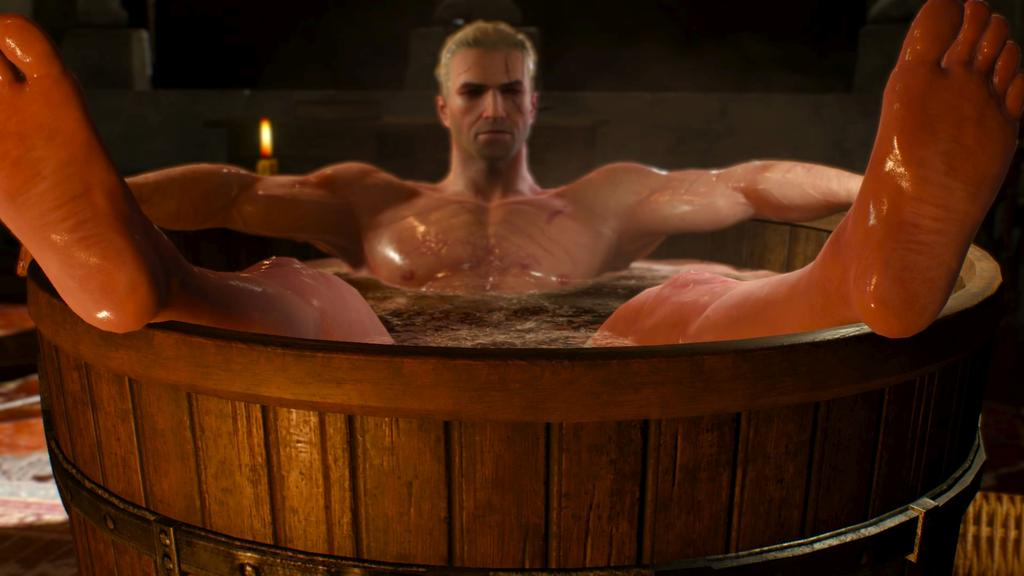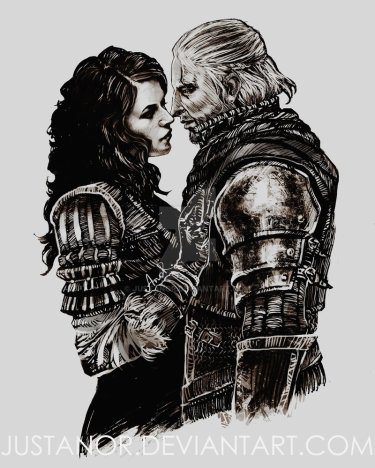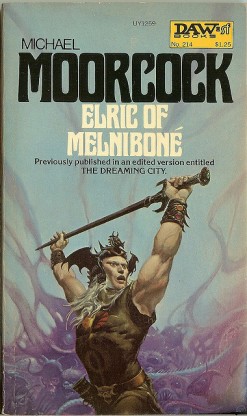As I’ve mentioned a couple times in passing, I’ve been slowly jaunting my way through the Witcher 3.

I don’t get to play it every day, and when I do sometimes it’s just for 20 or 30 minutes at a time, but the game is great about providing scattered morsels that can be gobbled up in increments. Sure, you can feast on its delectable story-meat as you work your way through the larger quests, but you can also fire it up just to nibble on a couple games of Gwent or lick a question mark or two off the map. Mmm, ghoul-flavored.
The world of the Witcher is a rich and engaging one, and the games are potent gateways to it. Having just finished the second Witcher book, Sword of Destiny, I’d highly recommend an expedition into the written media. To fans of SFF, Sapkowski offers a medieval world informed by the cultures, mythologies, and folklore of the Celts, the Slavs, and other Germanic traditions. It’s a dark and dangerous one, but filled with many wondrous elements.
One criticism I’ve encountered of GRRM’s Song of Ice and Fire series is the grim nihilism and brutal cruelty inherent in its universe. Sometimes it feels like rape after rape after murder. Kaiju has leveled this charge and cites it as the main reason the stories lost his interest. While Sapkowski’s creation doesn’t shy away from the harsh realities of war, poverty, and feudal life, I don’t find it quite as bleak as Martin’s work.
Geralt is certainly a brooding, angsty fellow, but you might be too if you had been mutated by drugs and magic and then spent half a century or more hunting monsters and witnessing the horrors they’ve wrought upon humanity. The Witcher is an interesting hero, however (I originally wrote “antihero” here, but it doesn’t seem to fit). While I’m not sure yet whether I’d venture to label him as “superversive,” he possesses a complexity and nobility that is difficult to dismiss. Though he is an unquestionable man-slut and possesses his share of vices, we can often see why he exhibits such spiritually destructive behavior and the damage it does to him.
In some of the early Witcher stories, we’re repeatedly reminded of the fact that witchers are mutants, rendered sterile. Similarly sorcerers and sorceresses are made barren by the magic they wield. Power comes at a cost. A part of Geralt has been riven by this element of who he is, and we can plainly see how it pains him. This is also one of the central themes of the stormy and self-destructive relationship between Geralt and the sorceress Yennefer. They are destined for one another, and yet they both regret their inability to reproduce. Nothing can come of their being together, it is said.

Certainly not a happy or uplifting part of the Geralt and Yennefer romance. However I find this tragedy adds a bit of a redemptive quality to the characters (particularly the oft-bitchy sorceress). Given the times we live in, when parenthood is often portrayed as an inconvenience and sexual “freedom” and promiscuity regarded as virtues, it’s satisfying (though also saddening) to see two characters possessed of immense power and freedom longing for “family” and mourning their inability to create. Indeed, Yennefer’s quest and obsession is to find a way to restore her fertility – something which, at least at the point in the story I’ve read up to, is considered impossible.
Unlike many of Martin’s characters, Geralt is also able to adhere to his morality without being savagely beheaded or piked or torn asunder, despite the hostility of a gray world. He is fiercely loyal to his friends and assists others in need when able. He often dismisses this, calling himself a mercenary, but at times he accepts pittance for payment when dispatching monsters or protecting those in danger. Even when it comes to monsters, he refuses to slay creatures that are intelligent and benign or endangered. And he won’t kill humans for pay.
There are many other interesting aspects of Geralt and the Witcher, and I intend to dig further in the future. For now, I’ve started reading Elric of Melnibone and Three Hearts and Three Lions. Though I don’t know that Sapkowski has read Moorcock or Anderson, it would surprised me if he hadn’t, and I’ve spotted several themes of the Witcher and characteristics of its protagonist (some as simple as Geralt’s white hair and nickname of “White Wolf”) that lead me to believe they may have been major inspirations of his.

Time will tell, and I’ll report more as I’m able.
-Bushi

I just wrote a short bit about why everyone should read the Witcher series. Great books, and I loved the witcher 3!!
LikeLiked by 1 person
There’s a Youtuber called The Rageaholic who has made the bold claim that Andrzej Sapkowski plagiarized Michael Moorcock’s Elric and created the Witcher. Do you think there is some merit to this accusation?
LikeLiked by 1 person
I’ve seen this conversation or similar ones online before.
Having read both I think it’s pretty clear that Sapkowski drew upon Elric for inspiration, and I think he should admit as much.
That said, I wouldn’t call it plagiarism. Geralt is pretty distinct as a character, as is Sapkoswki’s heavily Slavic-folklore-inspired Witcher World.
LikeLike
Alright, thanks for the reply. I’m looking forward to reading Elric. AFTER I’ve finished with the greatness that is Robert E. Howard.
LikeLiked by 1 person